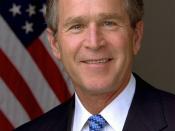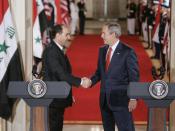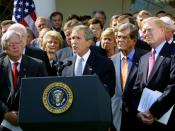Some news organizations, including The New York Times, are currently engaged in self-criticism over the run-up to the Iraq war. They are asking, as they should, why poorly documented claims of a dire threat received prominent, uncritical coverage, while contrary evidence was either ignored or played down.
But it's not just Iraq, and it's not just The Times. Many journalists seem to be having regrets about the broader context in which Iraq coverage was embedded: a climate in which the press wasn't willing to report negative information about George Bush.
People who get their news by skimming the front page, or by watching TV, must be feeling confused by the sudden change in Mr. Bush's character. For more than two years after 9/11, he was a straight shooter, all moral clarity and righteousness.
But now those people hear about a president who won't tell a straight story about why he took us to war in Iraq or how that war is going, who can't admit to and learn from mistakes, and who won't hold himself or anyone else accountable.
What happened?
The answer, of course, is that the straight shooter never existed. He was a fictitious character that the press, for various reasons, presented as reality.
The truth is that the character flaws that currently have even conservative pundits fuming have been visible all along. Mr. Bush's problems with the truth have long been apparent to anyone willing to check his budget arithmetic. His inability to admit mistakes has also been obvious for a long time. I first wrote about Mr. Bush's "infallibility complex" more than two years ago, and I wasn't being original.
So why did the press credit Mr. Bush with virtues that reporters knew he didn't possess? One answer is misplaced patriotism. After 9/11 much...


